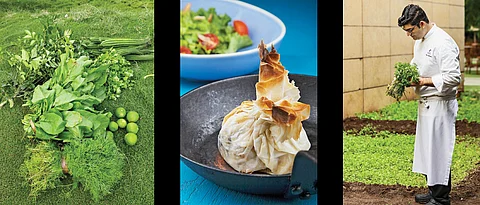

At Zeta, a fine-dining restaurant in Hyatt Regency Pune, executive chef Anirban Dasgupta created a storm when he introduced jowar and bajra tacos, and risotto whipped up from the city’s beloved Ambemohar rice, the aromatic variant grown in the foothills of the Western Ghats region of Maharashtra. The diners also enjoyed black rice dosa and hand-churned paneer, new entrants to the seasonal menu introducing a flavour of new-age sustainable ‘farm-to-fork’ dining experience.
So, what is sustainable dining? While India has traditionally followed farm-to-table approach, it is now truly coming to life with a philosophy of sustainability. It is the entire cycle — how food is sourced, whether its ingredients can be traced and trusted, how it is cooked, and finally, how waste is minimised and managed.
“My interest in food and its ingredients is deeply rooted in my childhood. Going to the market and choosing the right ingredients was something I have grown up with,” affirms Dasgupta. He continues to do the same with the remodelled restaurant in Hyatt Regency. The one-year-old Zeta takes pride in its own backyard kitchen garden where chillies, spinach, tomatoes and other root vegetables are grown organically, and used in the hotel’s kitchens.
Dasgupta is tying up with local farmers, small organic farmers and artisanal creameries to preserve native produce. For instance, he sources fresh cheeses from a home-cheese-maker in Mumbai who not only ensures the freshness and flavour but also works with local ingredients to churn out the best results. The microgreens, used in garnishing, come from a small-time urban farmer who carefully grows them on the terrace garden.
To promote sustainability, the chef and his team are looking beyond veggies and cheeses. They source yellow corn-fed chicken and Kadaknath, Indian breed of chicken, from a local poultry farm located in the outskirts of Pune. The result? Best quality eggs and meat with lots of flavour, and it inadvertently supports local ecosystem.
Pune-based restaurant Malaka Spice, which specialises in Southeast Asian cuisine, has been running on the sustainability principle right from its inception. “For us, sustainability is a way of life. Whether it’s the ingredients that go in a dish or the way we serve the water at the restaurant or the farmers who work with us or the waste material treatment at the end of the day — each and everything we do, is centred around the very principle of sustainability,” explains Praful Chandwarkar, who along with his wife, the late Cheeru, started the restaurant in 1997.
A couple of years ago, Chandwarkar started an agricultural project called Cherish Farm, spread over 4 acres, and about 45 km from Pune city centre. The farm grows chemical-free vegetables and fruits like dodka, papdi, fenugreek, spring onion, Thai basil, kangkong, pandanu leaves, galangal, karvand, banana, fig and sapota, to name a few. Most of the ingredients on the seasonal menus are organic, and bought in a way that their source can be traced. This also includes fish caught fresh and viably.
Awareness and education are vital to keep up the pace of sustainable dining movement in India. In terms of awareness, Malaka Spice leaves no stone unturned. While it practises sustainable cooking and eating, it also educates its consumers on certain aspects of dining. It has come up with an ocean sensitive seafood calendar, which lists down the months best suited to eat fish, and the ones to avoid, especially during the breeding season, and when fishes are very young.
Yet another key player in the sustainable dining movement is The Market, a fine dining restaurant in The Westin Pune. Chef Abhishek Sehgal of The Market advocates sustainability at their ‘farm-to-table’ concept zone. He insists on chalkboarding the menu based on availability of fresh and traceable produce. The restaurant has even aesthetically transformed its poolside garden into a cosy-kitchen-herbs garden to better serve the purpose. It extensively engages with Anusayafresh for exotic vegetables which couldn’t possibly be grown locally due to soil and climate variations. The chef and his team make use of Indrayani rice, the organically grown variety of rice from the Maval region of Pune district, and regional fresh catch like pomfret and rawas (Indian salmon) to adorn their cyclic menu.
These examples prove the goodness of our backyards, and the need to know what goes in a dish. Though there is a long way to go, the pieces of the puzzle are slowly starting to come together.
